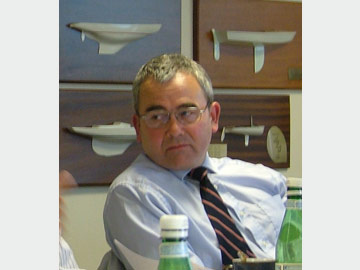 |
The Official
|
| www.sailing.org |

You focussed on the Committee's strategy going forward. What issues came up?
| 2009 ISAF Annual Conference - Quick Links |
|---|
| Click on the links below for all the key info on the 2009 ISAF Annual Conference |
| All the Conference news |
| Meeting Papers |
| Meeting Schedule |
| ISAF Rolex World Sailor of the Year Awards |
| ISAF Meetings microsite |
 |
I see a huge part of our work as really taking forward the projects which we now have great groundwork for. The Committees have been developing the Equipment Rules, really those are the tools to do a job with; the equipment control, making sure the boats are rules compliant on the race course and everything is fair for the sailors.
Now we're managing to streamline how we measure boats at the events. We're getting sailors buying equipment which is coming from the manufacturers ready certified, ready to use. That's clearly going to be a big thing for the future.
We've been tasked with making the equipment control at the Olympics as streamlined and as cost-effective as we can. We've already clearly tried to do that and if we can do that to a better standard for less, and in a way which can be done at other events as well, we'll really be winning.
Part of that is we're now getting a meaningful provision of measurement at the Sailing World Cup events. The whole point of that is we're getting to the Olympic sailors well ahead of the Olympics. Far better that everyone gets into the culture of making sure everything is right, everything is certified and in order before they turn up. That is a culture change but I think we've got the tools now to make it happen
You also discussed new ways of enforcing equipment control.
The RYA trialled at Sail for Gold a system of discretionary penalties, so sailors would get a penalty of 3 points or 7 points or something of that order docked from a race or the races of that day if something on their boat was found not to be quite right. It's not often a case of cheating, it's nearly always the case that something has slipped or someone hasn't been attentive enough to maintaining their boat. Nevertheless it isn't inline with the rules and in the past the only alternative has been that that person gets disqualified from that race or from that day. That's a draconian penalty for something that may or may not how fast their boat goes anyway. The Juries, under this system [of discretionary penalties], feel able to apply a penalty because it's much more appropriate to the nature of the offence. It certainly seems to be popular with the Juries, because they happily accommodated it. It also seems to be popular with the athletes as well, they seem to have taken it onboard.
So what's next?
It's being written in, in principle, into the Measurement Instructions for the World Cup, that's the next level.
For more on ISAF Classes and Equipment go to www.sailing.org/classes.
For more on the 2009 ISAF Annual Conference, visit www.sailing.org/meetings.













